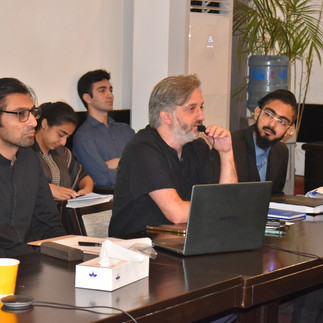Iqbal Symposium
- Apr 30, 2025
- 4 min read
Updated: May 6, 2025
Friday, April 25, 2025 | 2:30 - 6:15 PM | Faculty Lounge, VC Office, LUMS

The Gurmani Centre for Language and Literature hosted a wide-ranging symposium titled Iqbal Revisited: Exploring the Legacy, Paradoxes, and Relevance of a Poet-Philosopher for Today on April 25, 2025. The event brought together scholars from Pakistan and abroad to re-examine the intellectual, poetic, and philosophical contributions of Allama Muhammad Iqbal, considering contemporary existential, social, and spiritual crises. The symposium was structured around two sessions, each engaging Iqbal from distinct yet interconnected angles—one focusing on aesthetics, thought, and metaphysical questions, and the other offering more personal, cross-cultural, and historically situated reflections.
The first session opened with a compelling presentation by Dr. Syed Nomanul Haq, who invited the audience to recover the aesthetic essence of Iqbal’s verse. Dr. Haq urged listeners to encounter him as a poet whose language transcends the boundaries of argument and ideology. He argued that Iqbal’s mastery of rhythm, imagery, and emotional intensity produces a poetic experience that often exceeds the intellectual content of his work. The “lost verse,” as Dr. Haq described it, is not a matter of missing text but of neglected poetic resonance—those dimensions of Iqbal that defy paraphrase or doctrinal classification. His presentation was both a celebration of Iqbal’s linguistic richness and a critique of reductionist interpretations that fail to grasp the metaphysical beauty embedded in his language.
Dr. Nauman Faizi followed with a deeply philosophical exploration of Iqbal’s Reconstruction of Religious Thought in Islam. Framing reform as a necessarily paradoxical and broken project, Dr. Faizi argued that any authentic engagement with a fractured world must itself bear the marks of that brokenness. “If the era you're living in is broken, and that brokenness leaves no trace on you,” he said, “then there's good reason to mistrust you.” Reform, then, is not a posture of mastery but a condition of shared vulnerability. In this light, Iqbal’s philosophical project emerges not as a neat synthesis of religion and science but as an ongoing struggle with the tensions of freedom, divine will, and historical crisis.
Joining remotely from Turkey, Dr. Sevcan Öztürk offered a comparative reading of Iqbal and the Danish existentialist Søren Kierkegaard. Her presentation explored the shared emphasis both thinkers placed on subjective faith, ethical decision-making, and the paradox of religious truth. For both Kierkegaard and Iqbal, belief is not an abstract doctrine but a lived act of will, constantly renewed through struggle. Dr. Öztürk's talk suggested that Iqbal’s conception of selfhood (khudi), divine communication, and spiritual agency could be seen as parallel to Kierkegaard’s idea of the “leap of faith.” Her talk opened new interpretive possibilities for understanding Iqbal not just in Islamic or South Asian traditions, but in conversation with global currents in existential and post-Enlightenment philosophy.
The second session shifted tone and focus, beginning with a powerful and introspective talk by Khurram Ali Shafique. Titled In Search of Iqbal: A Personal Journey Through the Challenges of Uncovering His Truth, his presentation unfolded as a narrative of lifelong engagement, starting with a childhood memory of choosing a tiger over Iqbal’s portrait on a notebook, and culminating in decades of scholarship, revision, and discovery. Shafique described how he came to reject two dominant assumptions in Iqbal Studies: that Iqbal’s thought is riddled with unresolvable contradictions, and that his early and late writings are incompatible. Through close, faithful readings of Iqbal’s own words, both poetic and prose, Shafique discovered a deeply coherent metaphysical system rooted in will, love, and ethical purpose. He has since proposed the development of a new interpretive and pedagogical framework called “Iqbal Sciences,” one that speaks to individual moral agency and collective renewal.
Dr. Saida Mirsadri joined online with a presentation that examined Iqbal’s relevance to contemporary times. Emphasizing his call for selfhood, dignity, and moral renewal, she suggested that Iqbal offers a vision for navigating the crisis of modern subjectivity, one that challenges both passive traditionalism and hollow modernity. She reminded listeners that Iqbal’s significance lies not only in his critique of colonialism or his philosophical interventions, but in his invitation to reimagine what it means to live truthfully and courageously in an era of confusion and despair.
The final presentation of the symposium was delivered by Feyzullah Yılmaz, who offered an original and philosophically rich reading of Iqbal through the lens of nihilism and German thought, especially Nietzsche. Dr. Yılmaz argued that Iqbal’s intellectual evolution from 1909 to 1927 can be understood as a philosophical journey through and beyond nihilism—a term he defined through the dual lenses of disorientation and despair. Drawing on personal letters and poetic expressions from Iqbal’s early years, Dr. Yılmaz mapped a crisis of meaning in Iqbal’s work that mirrors the European post-metaphysical condition diagnosed by Nietzsche. However, unlike Nietzsche, who saw the death of God as an irreversible rupture, Iqbal responded by reconstructing a metaphysical vision grounded in divine immanence, moral will, and creative selfhood. Dr. Yılmaz’s talk introduced the audience to lesser-known influences on Iqbal, such as Al-Jili, and proposed a new philosophical narrative in which Iqbal emerges as a thinker who overcame modern nihilism not through rejection but through synthesis.
Taken together, the presentations formed a multi-dimensional portrait of Iqbal as poet, philosopher, mystic, and reformer. Across generational, disciplinary, and cultural differences, the speakers returned to a common insight: that Iqbal cannot be reduced to any single tradition or label. He is a thinker of contradictions, but not confusion, of crisis, but not despair. Whether explored through language, theology, personal memory, or global philosophy, Iqbal appeared throughout the symposium as a figure whose voice continues to resonate across time, borders, and disciplines. The event succeeded not only in revisiting Iqbal but in reawakening him as a living presence in thought and feeling, reminding the audience that the search for Iqbal is, in the end, a search for ourselves.























